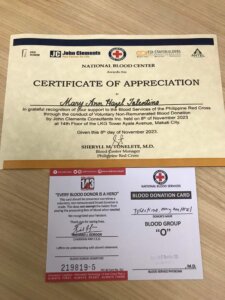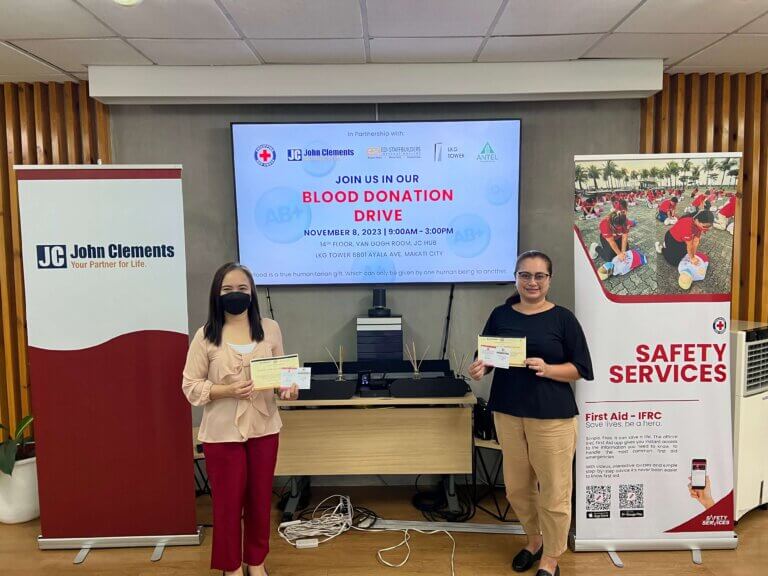When I first learned that John Clements Consultants, Inc. (JCCI) would be organizing a blood donation program in partnership with the Philippine Red Cross on November 8, 2023, I was determined to participate despite my current health condition.
Earlier this year, during my Annual Physical Checkup in March 2023, the results revealed fluctuating blood pressure. I consulted a cardiologist who initially prescribed a low-dose maintenance medicine for two weeks. However, as my blood pressure remained unstable, the doctor advised that I should take this maintenance medication for a lifetime.
Can People with Blood Pressure Conditions Donate Blood?
I was concerned that donating blood might worsen my condition, so I initially hesitated to join the blood donation program. However, upon re-reading the caption “Save Someone Today,” I realized that I could register and let the medical doctor in charge of the blood donation determine if I was eligible to donate.
To ensure medical clearance, I had an appointment with my cardiologist on November 3, and he wholeheartedly supported my decision, even describing it as a heroic act.
On the evening of November 7, I felt a mix of excitement and prayer for God’s permissive will to be part of the blood donation program. On November 8, I woke up with a sense of positivity and anticipation. After our Professional Staffers (PS) Business Unit check-in, Emily, my colleague at PS, and I headed to the Van Gogh Room of the JC Hub for the necessary medical validation. I was delighted to receive confirmation that I could indeed donate blood.
How Do I Donate Blood?
When my name was called, I lay down for the actual blood donation, which lasted for less than 15 minutes.


Following the donation, I was required to rest on another stretcher for an additional 10 minutes. My entire blood donation experience felt like a significant accomplishment.
It was a humbling experience to know that the blood I donated could potentially save another person’s life. Personally, this act not only contributed to my heart health but also gave me a deeper sense of purpose. I want to express my heartfelt gratitude to JCCI for organizing this meaningful activity, which provides an opportunity for individuals like me to make a positive impact on other people’s lives.
What to Do After Donating Blood
Other than resting a bit right after your donation, The Philippine Red Cross recommends the following steps to ensure your safety:
- Avoid heavy lifting for the rest of the day, or do not perform strenuous exercises after you donate.
- When you feel dizzy or light-headed, sit or lie down until you feel better.
- Don’t take off the strip bandage for the next few hours after donating.
- Avoid a skin rash by cleaning the area around the bandage using soap and water.
- If the needle site begins to bleed, apply pressure and raise your arm straight up for 5-10 minutes or until bleeding stops.
- Call the PRC at 1-866-236-3276 to report any additional health information that you forgot to tell them, if you have any problems, or if you need medical care after giving blood.
- Eat iron-rich foods.
What is the Importance of Blood Donation?
The blood you donate is used in transfusions, which is a procedure that replaces blood lost due to injury or during surgery. Donations may be used for a range of life-saving procedures or treatments. The blood may be used for women who have complications during childbirth; cancer patients may need them; children with severe anemia may be given donated blood, and accident victims with life-threatening injuries will need blood.
Regular blood donations from healthy people ensure that there will always be a sufficient supply to help people who need them anytime. Your donation is a gift that will save multiple lives.
Visit our Events page today for information on our upcoming activities, workshops, seminars, and other events.





